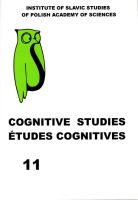Note sur l’adverbe temporel już et ses correspondants français
The notes about temporal adverb już and it’s french equivalents
Author(s): Denis Apothéloz, Małgorzata NowakowskaSubject(s): Language and Literature Studies
Published by: Instytut Slawistyki Polskiej Akademii Nauk
Keywords: contrastive study; Polish and French; aspectual-temporal Adverbs; już and déjà; Perfect; temporal deixis.
Summary/Abstract: Generally speaking, this contrastive study of the Polish temporal adverb już and the French déjà is based around the idea that już and déjà have an invariant meaning but it is also true that they follow different idiosyncratic usages. This article has two parts. First, the authors show the usages of już which are equivalent to those of déjà. These usages appear when już and déjà are put in a specific verbal context. The authors describe the four cases in which już and déjà are equivalent: “precocity of event”, existential usage, iterative-continuative usage, experiential perfect usage. Secondly, the authors analyze four cases in which the Polish adverb już can’t be translated by the French déjà. These incompatibilities can be explained by either morphological idiosyncrasy or the conventionalization of deictic meaning of już , which is absent of déjà.
Journal: Cognitive Studies | Études cognitives
- Issue Year: 2011
- Issue No: 11
- Page Range: 13-30
- Page Count: 18
- Language: French

